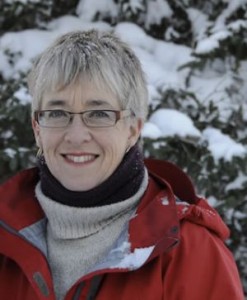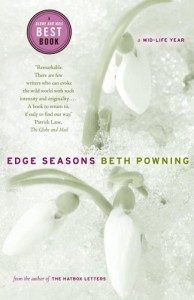Read Part 1 of this interview.
 Twice Beth has been guest author for my University of Toronto, School of Continuing Studies online course Memories into Story: Introduction to Life Writing, and I edited her memoir Edge Seasons (Knopf Canada, 2005). The following are questions some of my students asked Beth after reading three of her short memoirs: “Clotheslines,” “Hearing Loss,” and “A Grandmother’s Love.”
Twice Beth has been guest author for my University of Toronto, School of Continuing Studies online course Memories into Story: Introduction to Life Writing, and I edited her memoir Edge Seasons (Knopf Canada, 2005). The following are questions some of my students asked Beth after reading three of her short memoirs: “Clotheslines,” “Hearing Loss,” and “A Grandmother’s Love.”
When should I tell the voices that are inspiring me to shut up, to allow myself to edit what I’ve captured to a certain point? If I get into editing mode too soon, the inspiration may be lost, but if I don’t go there soon enough, I fear I’ll end up with an editing nightmare, a rat’s nest of raw words, detail, dialogue, storyline …
Beth: Ultimately, we write to share. We want other people to read what we have written. Writing is very much like talking. You know when you’re telling someone a dream, and that glazed look comes into their eyes? I think you have to keep that in mind when stream-of-conscious writing is pouring out of you. Stand back a little, and say to yourself: but what is this REALLY about?
For me, every book is really a question I have asked myself. I write to find the answer. I am undertaking an exploration. I’m seeking the heart of the matter, what lies deep underneath.
I think it is fantastic that you have this ability to hook onto that great surge of creative energy. My answer to your question has to do with standing back and being your own reader, and thus your own critic. Probably somewhere in that outpouring is a nugget, the heart of the matter. The outpouring must serve the heart, or meaning. The heart, or meaning, is in a way the sum of all the words, and yet is inchoate. Beyond words. Whew! That is the paradox of writing, and its great challenge. And great reward.
What advice can you give me about overcoming my internal saboteur, my inner critic, before I even start writing?
Beth: You know Virginia Woolf wrote about Mummy and Daddy sitting on her shoulder (something to that effect)? All I can say about this is that you have to be fierce, and IN THE ACT OF WRITING the inner critic usually flies away. You are there, in the moment of what you are describing and remembering and reliving, and you just do it. When it’s there on the paper, and you emerge and see what you have written, THEN is when you decide if you are going to share that truth with other people. And there are some things that perhaps you will never share, never try to have published. But still you can go there yourself, and take that journey, and be your best self when you’re doing it.
How do you manage your own feelings while writing about deeply personal or painful experiences, especially when they involve other people?
Beth: One of the great revelations I had as a writing student was that I had to tell the truth. I remember the very moment I had this thought. It was enormous, the realization that art and truth are inseparable. Since then, I’ve learned how truth is surprising, vital, alive. It is what makes writing fascinating. And it is beyond you, larger than you. What I’m getting at is that when I explore an experience such as what you describe (painful, involving other people) there is something there that is bigger than me, bigger than the other people. A perspective into which the issues fit. It is the larger thing that is the truth, and knowing this enables me to write about it, once I have seen, or found, that truth.
This sounds a bit abstract, I know. And I will say that I am often scared when I’m writing. I was terrified when I was writing Shadow Child. I felt as if I had a weight on my shoulders, and sometimes at night I would get out of bed and walk around in actual physical pain. But once I started that book, the larger thing, the underlying truth, was like a great current that had me in its grip.
So I didn’t really manage my feelings, I guess. Rather, I allowed them.
How do you get past the emotional scars that memoir writing can conjure up?
Beth: When I’m writing about those things, my heart is racing, sometimes I have tears in my eyes, but my fingers keep moving. Perhaps like a surgeon … I am taking those memories outside of myself. Once I have written about them, the pain is lessened. I may still feel sadness, but somehow it is different. I have seen the pain, I have worked with it. I have shared it. It’s like shedding light on something in a dark closet that has always terrified you because you could not see it clearly.
How do you resist the temptation to censor certain observations and feelings in your work?
Beth: I guess if there is something that I realize I am going to have to heavily censor, then I don’t write about it. There are many things I haven’t written about.
But there are ways, too, that you can censor while still telling the truth. You don’t have to tell everything. One of the things you can do is write from the gut in a first draft. Get it down, get it out. Then you have the raw material to shape, prune, edit. Hopefully in that draft, you have gotten at the depths of the story and can save what is compelling and true.
I enjoyed “Barefoot in the Snow,” your essay in Dropped Threads 3. I admire your ability to write with grace about subjects still taboo and yet common to all women. To do so do you have to come to a point within yourself where you are at peace with life’s transitions, or is the effect in this story the result of skill in writing and polishing? Or both?
Beth: Well, I think it is both. One of the things I realize is that women in my generation talk talk talk about the things that were taboo to our mothers. As if we’re making up for that great silence! Also in the rural community I live in, where many of my friends have moved here from others parts of Canada and other countries, we are each other’s sisters–and in the absence of real family, we are extremely open. So I am comfortable with talking about intimate issues. And of course, that piece was edited by a marvellous editor, and I did a lot of work on it.
In a memoir have you ever changed any names or references to protect others’ privacy or identity?
Beth: Yes.
 Have you ever had anyone contest, or tell you they were hurt by, anything you wrote in a memoir, and if so, how did you deal with it?
Have you ever had anyone contest, or tell you they were hurt by, anything you wrote in a memoir, and if so, how did you deal with it?
Beth: No, I’ve never had anyone contest what I’ve written, or say they were hurt by it. I have asked people if they minded if I wrote about them, and even asked if I could use their real names (as in “Patricia and Kevin” in Edge Seasons).
I realize that there are memoirs dealing with issues much more “dangerous” or darker that the ones I have written about. Shadow Child, Seeds of Another Summer, and Edge Seasons are my own explorations of displacement, loss, and change. Not divorce, abuse, family violence … therefore there was less of a challenge to obscure names and events.
What is your favourite among stories you’ve written?
Beth: I am very fond of some of my earliest essays in my book Seeds of Another Summer. There’s one about cutting down a maple tree that is close to my heart.
If a reviewer were to compare you to another author, who would you like it to be? Why?
Beth: Well, that’s a hard one. It might be the English poet and novelist Helen Dunmore, whose writing has a lyricism that I think is like mine. She wrote A Spell of Winter and Zennor in Darkness, among others. I can feel poetry close beneath the prose.
What is your guilty reading pleasure?
Beth: Quite a few of these … they are the books I read just before going to sleep. Rumpole of the Bailey, Swallows and Amazons, P.G. Wodehouse’s Bertie and Jeeves series.
Your resumé describes your other community involvements, gardening, choral singing, energy management, French Immersion, Project Ploughshares, photography. How do you make time for this? My impression is that writing is a full-time commitment.
Beth: I have always had enormous energy, and am a driven person. When I was in my 40s, my mother gave me a book called For Women Who Do Too Much and I realized that, yes, I have always done too much. I write 3 to 4 hours a day. But I burst from that writing room and tear into gardens, ponies, singing lessons, community stuff. It is as if I am two different people. That silent, brooding person sitting at my computer (that no one sees or particularly knows about) and the other person who is intensely active.
My university teacher, E.L.Doctorow, said, When you’re writing, don’t think about anything else. When you’re not writing, don’t think about the writing. I’ve always followed that advice.
Find out more about Beth Powning and read some of her work at www.powning.com.
I love your raw wisdom, the “get it down, get it out.” Telling the truth while not telling everything and concentrating on what is at hand are essential pieces of a writing life. Thank you for sharing your interview, and, as always, for speaking the truth so clearly.